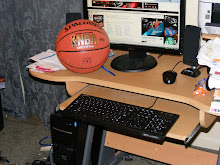This was LeBron Week, so I guess it's time to chime in and say something about the Miami Heat.
The media have swooped down on Miami like vultures on a fresh carcass and done everything from fire the coach to trade one of the team's key players.
It has become really cool all of a sudden, like wearing a leather jacket and smoking cigarettes in the '70s, to say something bad about LeBron James or the Miami Heat.
DON'T SPEAK TOO SOON
Part of this hysteria is really nothing but overreaction.
Dan Patrick had the greatest observation of this phenomenon. He often talks about how football fans and reporters overreact and think they are going to the Super Bowl or think the season is over after their team wins or loses the first game or two of the season.
It is unfair to judge Miami at this point due to the number of players who have not been available.
Mario Chalmers battled an ankle injury and didn't play 20 minutes in any game until November 27 and has done so only four times so far this season.
Miami is 3-1 in those games.
I saw Chalmers play for about five minutes in the second half against Washington, his second game playing at least 20 minutes. There was more ball movement for Miami in those five minutes than there had been all season combined without Chalmers on the floor.
The Heat also obviously misses Mike Miller.
My only criticism of Erik Spoelstra is the limited playing time he has given Joel Anthony. For what it's worth, Miami is 7-1 when Anthony plays at least 20 minutes.
It probably has something to do with the fact that he leads the team with 1.2 blocks per game despite averaging only 18 minutes.
To those shoveling dirt on Miami's grave, you may want to tone down the rhetoric, unless you want to look really stupid in a few weeks.
BEATING A DEAD HORSE
The impact that injuries are having on this season can't be emphasized enough.
Golden State is the latest team to be bitten by the injury bug.
Golden State started the season as one of the best teams in the league at 6-2. Then David Lee injured his elbow and missed eight games.
The Warriors lost one of Lee's backups (Brandan Wright) to a back injury two games after Lee went out. They were already playing without top pick Ekpe Udoh, who hasn't played all season due to a wrist injury.
The result has been an incredibly thin front line which has seen the team limp to a 2-9 record in its last 11 games (1-7 without Lee).
It got so bad that Keith Smart had to resort to starting Vladimir Radmanovic at power forward for a few games before he ditched the idea and went back to Dan Gadzuric.
Neither idea worked, and the team is now struggling to find itself.
THE DEFINITION OF CLUTCH
There has been a change in how clutch will be defined when games are analyzed.
Clutch will now be defined as the last two minutes of the game or overtime when no team is ahead by more than three points.
It was changed from the last five minutes because the five-minute mark just doesn't feel big enough or important enough when watching close games and because it is much easier to track the last two minutes of a game as compared to the last five minutes.
Players who make shots during this time will be judged based on whether their team is behind, tied or leading with the following priority:
(1.) Trailing
(2.) Tied
(3.) Leading
Priority will also be given based on the time the shot takes place, with the following order of importance:
(1.) 0-10 seconds
(2.) 10.1-24 seconds
(3.) 24.1-30 seconds
(4.) 30.1-1:00 minute
(5.) 1:01-1:30 seconds
(6.) 1:31-2:00 minutes
So a player who hits a go-ahead shot with two minutes left won't be considered as clutch as a player who hits one with 10 seconds remaining.
Game-winners will be defined as shots with 10 seconds or less in the fourth quarter or overtime which give a team the lead for good. This matches how Elias Sports Bureau defines and tracks game-winners.
Game-winning shots will be prioritized in the following order:
(1.) Lead-changing game-winners
(2.) Game-winners
(3.) Game-clinchers
Game-clinchers or icers or daggers aren't really game-winners because they come when the team is already ahead. But something had to be created for players who put games away like this.
Lead-changing game-winners are defined as the most clutch due to the player having so much on the line.
For a player who misses a shot with the score tied, the worst which can happen is that the game goes into overtime.
But a player who misses a shot when his team is behind loses the game. He then has to answer all of the questions about what happened and live for a minimum of 24 hours with the fact that he let his team down.
It is such a pressurized situation that players who step up to the challenge deserve more credit when they pull it off.
Comment or e-mail: thenbaoutsider@yahoo.com
Tweet
Subscribe to:
Post Comments (Atom)

No comments:
Post a Comment